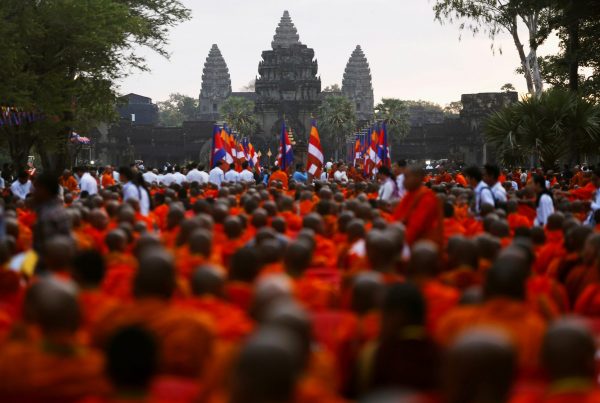The opposition Cambodia National Rescue Party (CNRP) was dissolved, a move that has effectively instated one-party rule in Cambodia. This marks the endpoint of Cambodia’s era of electoral democracy — an era in which the opposition may have faced uphill struggles but was nonetheless dependably allowed to contest elections.
In hindsight, the dissolution of the opposition seems to follow a carefully orchestrated plan which unfolded over the year. The ‘grand finale’ was probably fixed in response to June’s commune election, in which the CPP won 51 per cent of the votes compared to the CNRP’s 44 per cent — enough to raise the possibility of a 2018 electoral victory for the CNRP.
Long-time opposition leader Sam Rainsy, who was formally exiled after October 2016, was prompted to resign in February by the announcement of planned amendments to the Law on Political Parties that bar convicts from leading political parties. Further amendments to the Law in July sought to erase Sam Rainsy’s spectral presence from the Kingdom by prohibiting parties from associating with, or using the voice of, image of or documents authored by any convict.
Kem Sokha, who had taken up the CNRP presidency, was then arrested in September and charged with treason for ‘conspiring with a foreign power’ (namely the United States) to stage an alleged ‘colour revolution’. Two months later, the Supreme Court dissolved the CNRP over the alleged plot and banned 118 party officials from politics for five years. As the year came to an end, the top CNRP leadership found themselves in exile, where they lobbied for international sanctions with Sam Rainsy, who announced his return to politics on the eve of the CNRP’s dissolution. At home, CNRP lower house and commune chief seats have been redistributed to minor parties and the CPP respectively.
The opposition has long termed Hun Sen’s clinging to power as anachronistic. Though this may have been true until recently, in terms of the domestic mood, it is not in a regional or international sense. China’s full political and economic support enables Cambodia’s shift to autocracy, which occurs in the context of President Trump’s voluntary handing over of American regional and global leadership to China. Cambodia’s new course is in line with or even ahead of the times. The government is likely prepared to pursue this path to the end, with Cambodia possibly transitioning to a new, durable and Chinese-inspired model.
The CPP will not allow an electoral challenge that could lead to regime change in this new political order. Nevertheless, a ‘multi-party system’ formally remains in place, albeit exclusively populated by the CPP and minor, unthreatening parties.
Sok Touch, Director of the Royal Academy of Cambodia, branded the CNRP’s dissolution as the ‘strengthening of democracy’. Independent scholars have similarly argued that democracy can be maintained in the new order. The acceptance by public intellectuals of the CNRP’s dissolution suggests a newly established consensual tolerance for the CPP to single-handedly orchestrate political change.
Cambodia will be an increasingly inhospitable place for the media. Newspapers and radio used to be relatively free, but between August and September 2017 independent radio stations, Radio Free Asia’s Phnom Penh office and the newspaper The Cambodia Daily were forced to close . In November, two former Radio Free Asia journalists were arrested and charged with espionage. Prime Minister Hun Sen’s erstwhile social media anxiety is long gone: his Facebook page hit second place among world leaders in terms of page interactions during the year. A series of arrests of critical Facebook users conform to the regional trend of declining internet freedom.
The crackdown’s third main target — civil society — has been significantly weakened by measures such as suppression of the election monitoring consortium ‘Situation Room’, the US National Democratic Institute and the threatened disbandment of the Cambodian Centre for Human Rights. This is where further restrictive government action will likely be concentrated: in the absence of strife in the party-political arena, the battleground will likely shift to rooting out grassroots activism.
The opposition has sometimes been ridiculed for its perceived over-reliance on the international community, but current events have to some extent vindicated this position. Sanctions represent the only realistic possibility of a somewhat modified course of government action, though a highly uncertain one where its efficacy likely hinges on crass economic calculations alone. Current sanctions include cancelled US and EU election support and US visa sanctions against top government officials. The European Parliament recommended EU visa sanctions, asset freezes and a review of the preferential Everything But Arms scheme.
Domestically, popular discontent will be prevented from reaching the streets by elite cohesion and the threat of violence from an army under Hun Sen’s consolidated control.
No matter how you look at it, the CPP is certain to stay in power beyond the July 2018 elections. In the unlikely event that the opposition was not only allowed to participate in but also managed to win the elections, the CPP would certainly use the army to prevent a power transfer and military-style rule could be introduced.
Two weeks after the CNRP’s dissolution, Hun Sen organised a peace ceremony at Angkor in which he drew on regal symbolism in the glaring absence of the actual king. With Hun Sen performing both as rebel king Sdech Kan and as an inheritor of the Angkorean kings, Cambodians will now look to dynastic succession within the Hun family rather than to elections for change.
Astrid Norén-Nilsson is an Associate Senior Lecturer at the Centre for East and South-East Asian Studies, Lund University and author of Cambodia’s Second Kingdom: Nation, Imagination, and Democracy. This article is part of an EAF special feature series on 2017 in review and the year ahead.

